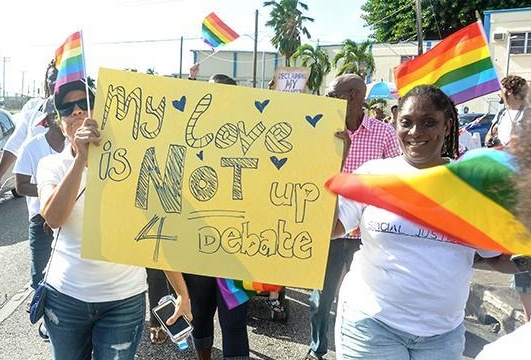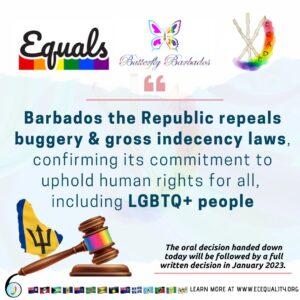Barbados High Court strikes down anti-gay laws
The High Court of Barbados struck down the nation’s laws against buggery and gross indecency, making the Caribbean island the third country in the region to have its laws against same-sex intimacy struck down this year.

Barbados inherited its laws against same-sex intimacy from the British colonial administration, but has maintained them since independence in 1966. Under the Sexual Offences Act, “buggery” carried a potential sentence of life in prison, while “serious indecency” carried up to ten years imprisonment. The law was rarely enforced against consensual sex, but had a chilling effect on the island’s LGBT community.
The High Court’s judgement was delivered orally, with a written judgement expected in January. It is not yet clear if the Barbadian government will appeal the decision. Any appeal would be heard at the Barbados Court of Appeal, and then possibly at the Caribbean Court of Justice, the final court of Barbados.
The decision brings the total number of countries with laws criminalizing same-sex intimacy down to 68.
The High Court challenge to the law was filed by two local LGBT activists together with the Eastern Caribbean Alliance for Diversity and Equality (ECADE). The case was part of a coordinated strategy by LGBT activists across the region to challenge anti-gay laws that remain in several former British colonies. The strategy has already delivered big wins, with courts striking down sodomy laws in Antigua & Barbuda and St. Kitts & Nevis this summer. Additional cases are awaiting decisions in St. Lucia, St. Vincent & the Grenadines, Grenada, and Dominica.
A separate case challenging Jamaica’s sodomy laws filed by 76crimes contributor Maurice Tomlinson is also winding its way through Jamaican courts.
An unrelated challenge to Barbados’ buggery laws filed by 76crimes contributor Alexa Hoffman at the Interamerican Court of Human Rights is also still pending. The status of that case is currently unclear.
Courts also struck down sodomy laws in Belize in 2016 and in Trinidad & Tobago in 2018, although the latter decision is being appealed by the government.
Celebration from LGBT and human rights activists was swift.
“This judgment, the 3rd this year in the Caribbean, consolidates the rights of all Barbadians to privacy and freedom of expression, and impacts LGBTQ+ people across the eastern Caribbean,” said ECADE in a tweet following the decision.

“This historic decision is a significant step towards protecting the human rights and dignity of LGBT people in Barbados,” said Luisa Cabal, UNAIDS Regional Director for Latin America and the Caribbean in a press statement. “It will also strengthen the country’s HIV response by helping to reduce stigma and discrimination faced by LGBT people and increasing the uptake of HIV testing, treatment and prevention services.”
“It’s gone from a certain ripple effect to a tidal wave in the Caribbean, which is what everyone involved set out to achieve,” said Téa Braun, chief executive of the London-based Human Dignity Trust in The Guardian.
The judgement may have been buoyed by a ruling earlier this year by the Caribbean Court of Justice, which found that rape laws applied even when the victim was male, and that “buggery” was not the appropriate charge to be used in that offence. That ruling meant that repealing buggery laws would not make nonconsensual anal sex legal.
Barbados’ Prime Minister Mia Mottley is believed to be an ally of the LGBTQ+ community. In 2020, facing criticism for an immigration scheme that excluded same-sex married couples, her government hastily revised the program to allow same-sex partners to apply. She also announced that her government would introduce same-sex civil unions and propose a referendum on same-sex marriage, although neither commitment has materialized. That same year, her government enacted an employment discrimination law that prohibited discrimination based on sexual orientation, but not gender identity.




Commentary: Cutting off USAID is like unplugging life support